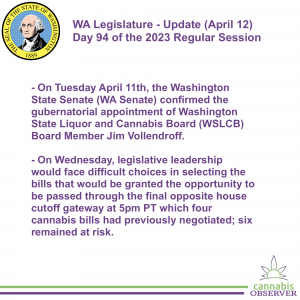None of four well-positioned cannabis bills were considered on Tuesday and remained in competition for limited opportunities for movement through the last cutoff gateway on Wednesday.
Here are some observations of the Washington State Legislature (WA Legislature) for Wednesday April 12th, the 94th day of the 2023 Regular Session.
My top 2 takeaways:
- On Tuesday April 11th, the Washington State Senate (WA Senate) confirmed the gubernatorial appointment of Washington State Liquor and Cannabis Board (WSLCB) Board Member Jim Vollendroff.
- Senator Karen Keiser spoke in support of Vollendroff’s confirmation, expressing how helpful she considered it to be to have someone steeped in the behavioral health sciences helping lead the agency. Senators unanimously confirmed Vollendroff’s appointment.
- All three WSLCB board members were confirmed during the 2023 regular session, a process which often takes years to complete.
- On Wednesday, legislative leadership would face difficult choices in selecting the bills that would be granted the opportunity to be passed through the final opposite house cutoff gateway at 5pm PT which four cannabis bills had previously negotiated; six remained at risk.
- The Washington State Senate planned to convene at 9am on Wednesday.
- At publication time, two cannabis bills were available for second and third readings on the regular calendar and required consideration on Wednesday in order to proceed by usual means; 65 other bills were similarly positioned:
- Three cannabis bills were available to senators for concurrence with House changes:
- No cannabis-related bills remained in the Washington State Senate Rules Committee (WA Senate RULE).
- After working late into early Tuesday morning to amend and pass highly controversial legislation on controlled substances other than cannabis, Representatives postponed their planned start time and planned to reconvene on Wednesday April 12th at 10am PT.
- At publication time, two cannabis bills were available on the House floor calendar and required consideration on Wednesday in order to proceed by usual means; 35 other bills were similarly positioned:
- One cannabis bill was available to representatives for concurrence with Senate changes:
- HB 1066 - “Making technical corrections and removing obsolete language from the Revised Code of Washington pursuant to RCW 1.08.025.”
- Two cannabis bills remained assigned to the Washington State House Rules Committee (WA House RUL) awaiting pulls to the House floor calendar - and would likely remain there:
- Wednesday April 12th at 5pm would occasion the opposite house cutoff, the final gateway before the end of the regular session, described as the “Last day to consider (pass) opposite house bills (5 p.m.) (except initiatives and alternatives to initiatives, budgets and matters necessary to implement budgets, differences between the houses, and matters incident to the interim and closing of the session).”
- Legislation can be declared "necessary to implement budgets" (NTIB), an informal procedure leadership can exercise around any bill with a fiscal impact. The criteria for NTIB status and the decision making around the designation hadn’t been set in law or rule, allowing for a bypass of the cutoff calendar which is agreed to by both chambers through the legislative process.
- The Washington State Senate planned to convene at 9am on Wednesday.
